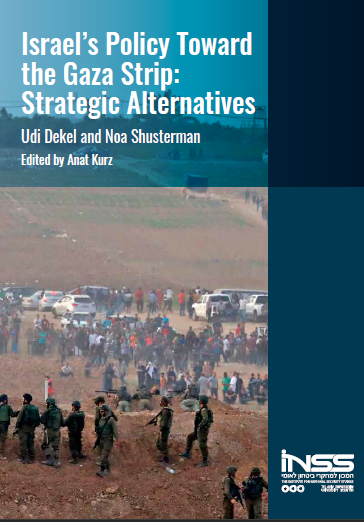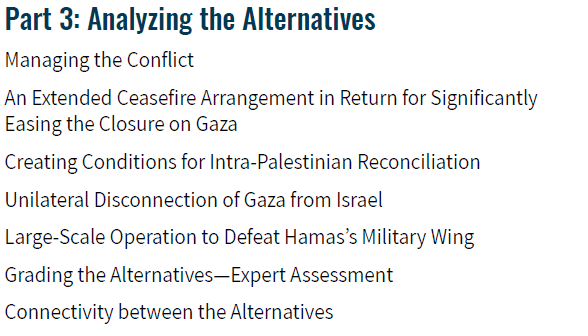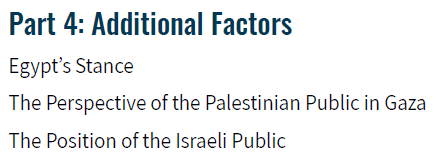Publications
The Institute for National Security Studies, April 2020

The Gaza Strip has been in an ongoing crisis since the Israeli disengagement from Gaza in 2005, especially since Hamas took over the territory by force. The situation in Gaza is characterized by economic, social, and infrastructural distress—verging on a humanitarian crisis—and influenced by the political rivalry and struggle for leadership of the Palestinian camp between Hamas on one hand, and Fatah and the Palestinian Authority on the other. Hamas’s inability to provide for the needs of Gaza’s population serves as a motivating factor for its belligerent tendencies and for military escalation between Israel and Hamas and the other terrorist groups active in Gaza. Hamas’s comprehensive and stable control of the territory, along with its proven ability to cause damage, has led to unofficial Israeli recognition of Hamas as the sole body responsible for the Gaza Strip.
Editor: Anat Kurz
Three rounds of fighting between Israel and Hamas (2009, 2012, and 2014) have caused wide-scale destruction of civilian infrastructure in Gaza, and socioeconomic collapse of Gaza has continued since then. Israel has imposed a closure on Gaza, which severely restricts the passage of goods and people in and out of the territory. In addition, in recent years, the Palestinian Authority has significantly reduced the transfer of money and has been unwilling to cooperate with the Hamas government.
The increasing distress in Gaza, the sense of being imprisoned, and its lack of a political horizon have made it easy for Hamas to direct the rage of the masses toward Israel; for the past two years, it has been expressed by the “Great March of Return” demonstrations organized along the fence and by constantly harassing the Israeli communities near Gaza with rocket fire, mortar shells, explosive balloons, incendiary kites, and attack drones. In addition, Hamas occasionally has initiated controlled escalation against Israel as a way of trying to force Israel to reduce the pressure on Gaza and to place the blame on Israel for Gaza’s distress.
In order to address the challenge that the Gaza Strip poses—due to its dark future, the negative consequences for Israel’s security, as well as the deteriorating sense of personal safety in communities near the southern border and beyond—the Institute for National Security Studies (INSS) created a professional research group for the purpose of suggesting policy that meets the State of Israel’s diplomatic and defense objectives while relieving the severe problem of the Gaza Strip. During the process of analyzing and formulating recommendations, five main alternatives were examined—most of which have been raised in the public and military discourse—under the lens of how they serve and advance Israel’s interests. This document summarizes the deliberations and research process and imparts the main insights found.
On January 28, 2020, after this study was first published, President Donald Trump revealed his peace plan, also referred to as the “Deal of the Century.” According to Trump’s plan, the solution for Gaza requires that Hamas and the other terrorist organizations should be disarmed, Gaza should be demilitarized, and the Palestinian Authority should regain control over the territory. Over the past decade, multiple international bodies attempted to advance these objectives, offering economic and political incentives, yet none reached a breakthrough. In the foreseeable future, under the premise that a drastic political change in the Palestinian arena is unlikely to occur, fulfilling the objectives presented in the plan does not seem probable, while the problem of Gaza will not disappear or dwindle. The political division between the Gaza Strip and the West Bank and between Fatah and Hamas will not change in response to the “Deal of the Century.” For this reason, Israel should continue to pursue a deliberate strategy to tackle the challenge of the Gaza Strip, while taking into account the overall context of the Palestinian arena.
The researchers who participated in the research group specialize in topics related to the Palestinian and regional arenas and have many years of experience dealing with the Israeli-Palestinian conflict. Some of them were active participants in recent decades in the rounds of negotiations and various talks with the Palestinians. The members of the team were Dr. Kobi Michael, Col. (res.), Adv. Pnina Sharvit Baruch, Mr. Yohanan Tzoreff, Dr. Anat Kurz, Brig. Gen. (ret.) Shlomo Brom, Lt. Colonel (ret.) Orna Mizrahi, Ms. Ruth Pines, Ambassador Dr. Oded Eran, Col. (res.) Adv. Gilead Sher, Brig. Gen. (res.) Assaf Orion, Ms. Noa Shusterman, and Brig. Gen. (res.) Udi Dekel.
![]()





